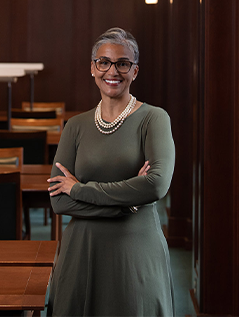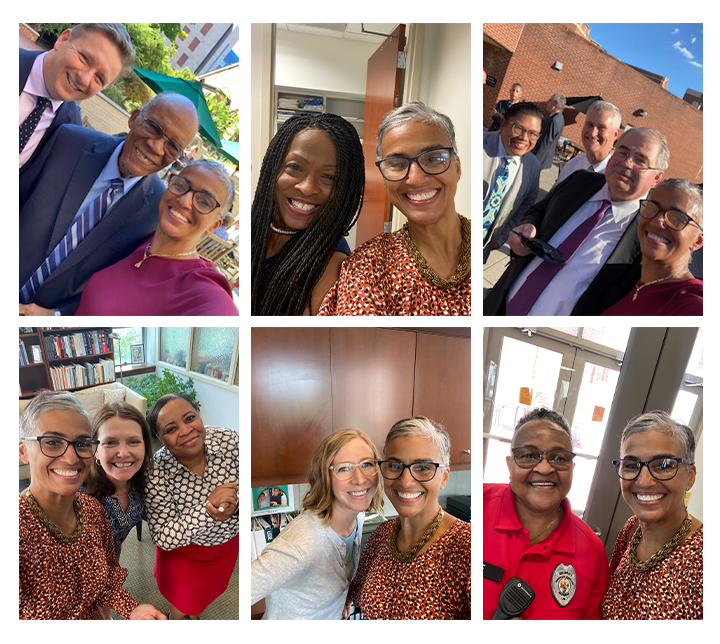 When Renée McDonald Hutchins began her tenure as Maryland Carey Law’s 11th dean in the quiet days of August 2022, her first order of business was to arrange individual meetings with all law school employees—associate deans, food service workers, program directors, and registration specialists.
When Renée McDonald Hutchins began her tenure as Maryland Carey Law’s 11th dean in the quiet days of August 2022, her first order of business was to arrange individual meetings with all law school employees—associate deans, food service workers, program directors, and registration specialists.
“Leaders need to be well acquainted with the people they work with toward the good of an institution,” she says, pointing to faculty and staff as well as students, alumni, clients, and partners in the legal community, “if you are going to advocate for them and be a megaphone for them and create a culture that they feel invested in.”
A faculty member and co-director of the Clinical Law Program at Maryland Carey Law from 2004 to 2019, Hutchins is in the beneficial position of already having deep roots within the law school and the Maryland bar and bench. She does not take her previous connections for granted, however, acknowledging that people’s lives have changed dramatically in the three turbulent years she was gone. That is why “listening and re-connecting” are at the top of the dean’s to-do list.
Being away for three years was also advantageous. She spent that time gaining experience as dean of the University of the District of Columbia (UDC) David A. Clarke School of Law where she made a meaningful impact, including, among many other successes, positioning UDC to improve its Clinical Law Program ranking from #13 to #5 in the nation—during the pandemic. That success helped make Hutchins an attractive candidate for the law school’s top job.
“Renée Hutchins is the ideal choice to lead Maryland Carey Law,” says University of Maryland, Baltimore, President Bruce Jarrell. “She is a proven leader, and I am confident that she will continue to move the law school forward in its trajectory of producing some of the best legal minds in Maryland and the country.”
For Hutchins, the chance to lead Maryland Carey Law was irresistible. “I love this school. I love my colleagues here. I love the students,” she says. “My kids grew up in these halls. I became an academic here. I am excited to see the good work we can do and what more we can build.”
Diversity Matters
With the fall semester now well under way, Hutchins is beginning to look toward some of her longer-term goals, one of which involves promoting diversity within the law school and the greater legal profession.
Fighting for racial justice, says Hutchins, is in her blood. As an undergraduate math major, she had not planned on pursuing law but found that thinking like a lawyer came naturally when she aced the LSAT. In law school, the inspiration to be a lawyer clicked when she looked back on a childhood saturated by stories of her activist great grandfather organizing for school integration in 1940s rural South Carolina. His profound belief in the American justice system and the ability of people to use it toward progress has fueled her throughout her career.
In 2015, following the death of Freddie Gray while in the custody of the Baltimore Police Department, Hutchins—then Maryland Carey Law’s Jacob A. France Professor of Public Interest Law and co-director of the Clinical Law Program—was instrumental in creating, “Freddie Gray’s Baltimore: Past, Present, and Moving Forward,” an innovative eight-week practicum that brought law school professors, elected officials, and civic leaders together with law and social work students to explore the broader historic context that created the West Baltimore community where Gray lived and died.
As dean, she plans to support similar programming and expand existing initiatives like the Diversity and Inclusion Scholars Program, which provides financial and professional support for students from diverse backgrounds through partnerships with area law firms and businesses.
The next step, Hutchins posits, is to work “very intentionally” to create pipelines of students out of Maryland’s HBCUs, such as the University of Maryland Eastern Shore and Morgan State University. Lifting up and providing access to students from those schools is “part of what justice looks like,” says the graduate of Spelman College, America’s oldest historically Black liberal arts college for women. From Spelman, she went on to earn a JD from Yale Law School.
Leaning into Excellence
Another goal for Hutchins is to hire additional faculty, the number of which shrunk following the Great Recession when enrollment dropped dramatically. “We reduced the size of the faculty for a lot of very good reasons,” she says, “but to ensure we are continuing to provide a first-rate program of legal education, I think we have to do some building back.”
Her reasoning is two-fold. Not only does the addition of faculty members guarantee curricular coverage, it also safeguards the mental health and work-life balance of folks who tend to spread themselves too thin in a profession that is infamous for valuing overwork.
“I believe that people should work hard, and then I believe that people should take time off and recharge and have family lives,” says the mom of two grown sons. “When people are whole people, they are happier and motivated to do their best work.” For which, she adds, the law school community deserves more national recognition.
With the UDC Clinical Law Program rankings success behind her, Hutchins is looking to raise the profile of Maryland Carey Law, asserting that the school’s U.S. News & World Report rankings do not reflect the merit of its programs. The answer? Amplify the accomplishments that are already happening.
“I want to speak out our excellence on a more regular basis,” she says, “to all of our stakeholders and constituents...all the time.”
Colleagues agree that Hutchins is the right person to take Maryland Carey Law to the next level on the national stage.
“Dean Hutchins is an extraordinarily gifted teacher, scholar and lawyer,” says Professor Michael Pinard, with whom she co-directed the Clinical Law Program. “As co-director, she elevated our Clinical Law Program by enhancing our national presence; amplifying our scholarship and service; ensuring that our students maximized their learning, understanding, and impact; analyzing our strengths and deficits; and working tirelessly to improve our program. She will do the same for our law school as dean.”
As for personal recognition, Hutchins is not looking for accolades—unless they come from students. Some of her greatest professional fulfillment comes, she says, from being named Professor of the Year by students or reading an evaluation expressing gratitude for her mentorship.
“That’s really why I do this,” she says. “It’s all for the students, so to have your joy and enthusiasm about what you are doing reflected back to you by the people you were hoping to impact is always for me the loveliest.”
Still, if she wished to toot her own horn, it would be an easy job.
At Yale, she was chair of the Moot Court Board of Directors, and, after graduation, clerked for the late Nathaniel R. Jones of the U.S. Court of Appeals for the Sixth Circuit. Her extensive legal experience spans federal and state courts across the country, including the high courts of New York and Maryland where she served three four-year terms on the Appellate Courts Judicial Nominating Commission. Currently, she is serving on the board of the Maryland Office of the Public Defender. She also taught in NYU’s groundbreaking Lawyering Program, which has influenced legal writing curricula nationally.
The New York native is a leading expert on the Fourth Amendment and criminal appellate practice. Her legal scholarship, which sits at the intersection of criminal procedure and social science, has been published in leading law journals and cited by numerous U.S. Courts of Appeals and state appellate courts. She authored the textbook Developing Professional Skills: Criminal Procedure and is co-author of the textbooks Learning Criminal Procedure and Essential Lawyering Skills. She also has written about racial profiling and the practice of stop-and-frisk, and has provided legal analysis and insight for media outlets such as MSNBC, Voice of America, and C-SPAN.
In 2017, Hutchins was elected to the prestigious American Law Institute, a national association of distinguished lawyers, judges, and academics that works to clarify and improve the law through the publication of restatements of the law and model codes.
A Pivotal Moment
Five minutes talking with Hutchins is enough to reveal her sparkling ability to engage and inspire people. Her enthusiasm and positivity are deeply compelling, as is her incisive mind. Describing her research interests, she switches into teaching mode, grabbing a piece of paper to illustrate how the Fourth Amendment relates to a case in which police searched garbage bins on property commonly considered her client’s. She draws the Baltimore City alley, the property lines, and the trash receptacles while animatedly explaining the legal implications.
“I love to think about everyday processes and the way they impact everyday Americans,” she says. “Neutral rules, when overlaid by a history that is fraught with any number of inequities, enhance and amplify those inequities in invisible ways.”
And never, she emphasizes, has it been more important to consider these issues and train lawyers who care about facts, the rule of law, and justice.
“American democracy is incredibly powerful and incredibly fragile,” warns Hutchins. “Now, more than ever, the work that law students are being trained in and being sent out to do is vitally important. Schools like Maryland Carey Law do the vital work of training lawyers to practice justice.”
Although Hutchins feels the weight of this solemn responsibility, she is also filled with hope inspired by a generation of young people whom she sees fighting for justice in spite of growing threats and challenges. That hope is echoed, too, by the chorus of voices at Maryland Carey Law singing a song of optimism and confidence in Hutchins’ leadership.
“We are absolutely thrilled that Renée Hutchins is Maryland Carey Law’s new dean. She is a brilliant, dynamic and compassionate leader,” says Amy Petkovsek ’06, immediate past president of the Alumni Board. “Dean Hutchins values the vital role the next generation of lawyers has in protecting our democracy. Her past connections to the law school bring an invaluable insight, and with her inspiring leadership and wisdom at the helm, the law school will surely reach new heights of excellence.” ■


